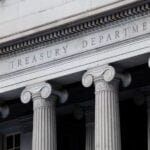Hong Kong Regulator Says DeFi Projects Could Face Regulatory Requirements – The interim head of intermediaries at Hong Kong’s Securities and Futures Commission (SFC), Keith Choy, has suggested that licensing requirements should apply to Decentralized Finance (DeFi) projects.
Choy emphasized that if DeFi activities fall under the Securities and Futures Ordinance (SFO), they should comply with the same regulatory standards as traditional financial activities. During a speech at the Web3 Festival in Hong Kong, Keith Choy announced that the Securities and Futures Commission (SFC) will be issuing regulations on Decentralized Finance (DeFi), following similar announcements from the United States and France.
People Also Read: Crypto Market Slides as Total Value Locked in Defi Falls Below $50 Billion Mark
Choy stated that while the SFC has always recognized the need for clear regulations in the DeFi industry, it had not yet fully articulated its perspective on the matter. A simple explanation for the situation is that digital currencies that compete on decentralized exchanges should also be subject to licensing requirements. According to Choy, offering automated trading services is a regulated activity under the Securities and Futures Ordinance (SFO).
Therefore, if a decentralized platform enables trading in digital assets that fall under the SFO’s definition of securities or futures, both the platform and its operators must obtain a Type 7 license. Choy also recognized that presenting an integrated system to the Hong Kong audience requires authorization.
He highlighted that DeFi poses challenges such as financial instability and limited transparency due to the lack of data from unauthorized companies and practices. Choy emphasized the importance of market integrity, including issues such as price oracle manipulation, front-running transactions, and investor protection concerns.
In December 2022, the Securities and Futures Commission (SFC) issued a notification to warn investors about the risks associated with virtual asset platforms. Additionally, a new licensing authority for digital asset trading platforms will be established in Hong Kong in June 2023. In February, the SFC released a new set of regulations for digital asset trading platforms.
People Also Read: Brazil Could Launch Its Defi-Integrated Digital Real In 2024
Along with implementing a licensing framework for crypto service providers, the authorities sought public opinions on whether licensed platforms should serve retail investors and what investor protection measures should be put in place. A recent US risk assessment report identified several major hacks and attacks in the DeFi space over the past few months, including North Korea’s use of DeFi for money laundering and other associated issues.
The report noted that the susceptibility of the DeFi space could be more complex if smart contracts are not adequately written or lack a process to spontaneously deactivate or modify in case of a loophole. Therefore, DeFi services must assess and address potential vulnerabilities that exploit the open-source code. Nevertheless, the report acknowledges the importance of DeFi, particularly for underdeveloped nations.




